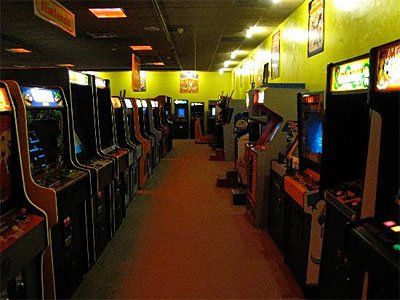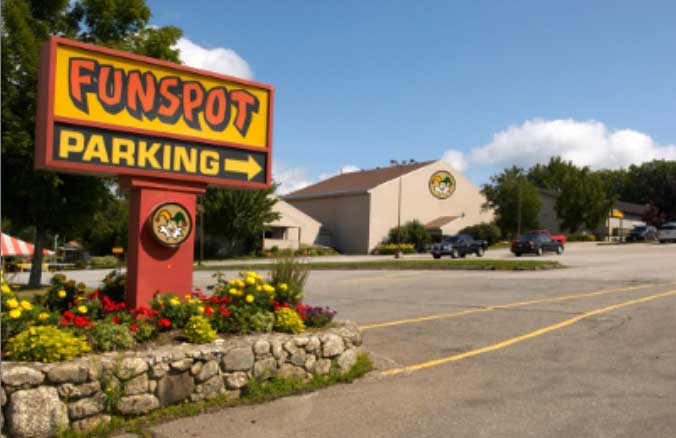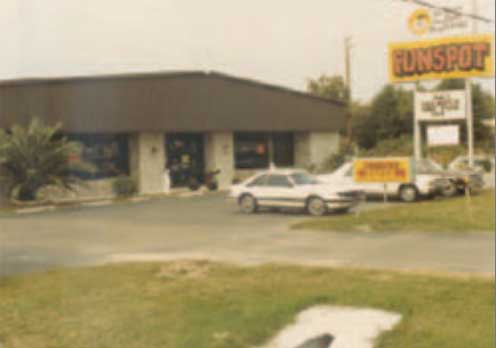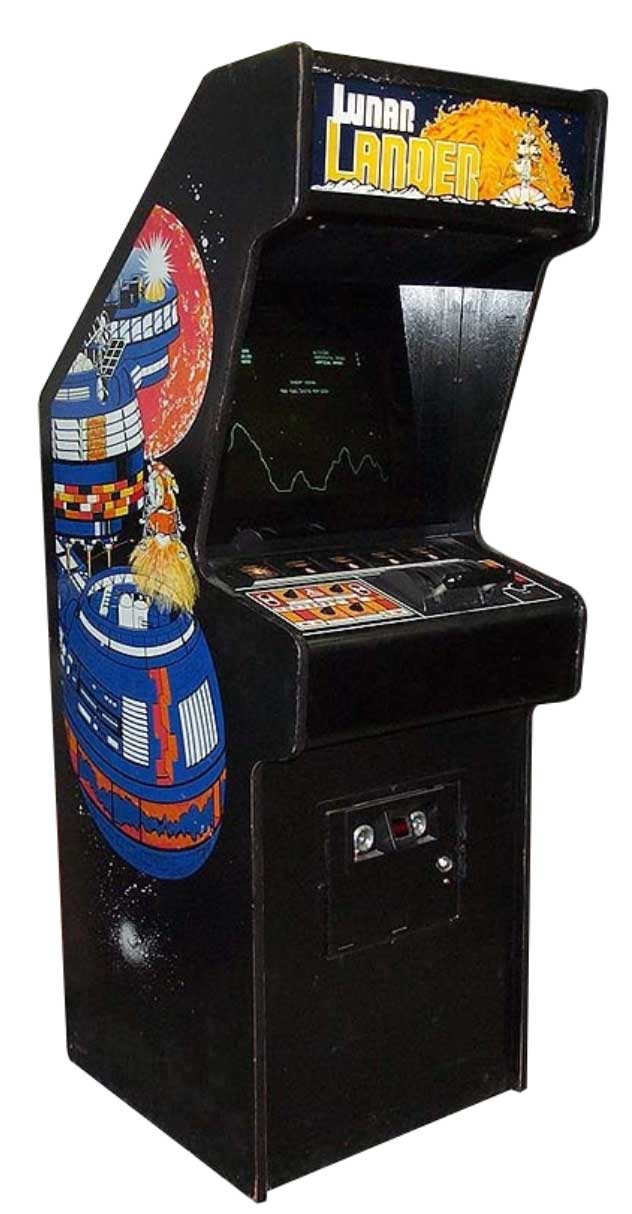Fun Without The Sun
September 14, 2003

To drive the rolling roads around Lake Winnipesaukee is to risk arriving, entirely by mistake, in some other decade. The Moultonborough general store rears up out of the year 1781. The area's grandly named little motels pull you straight back to the 1950s. The motor ship Mount Washington has been carrying passengers around the lake since 1940. And then there is one little corner of Laconia where it is forever 1983, and robots are trying to take over the earth.
The robots are villains in the 20-year-old video game Robotron, and their home is the Funspot, a sprawling arcade and mini-golf center which among its many attractions has slowly become the single largest repository of out-of-circulation video games in the known world.
The Funspot complex in Weirs, NH.
It's hard to miss the Funspot, even if you are trying. Its cartoony green dragon blows smoke on billboards for miles around, advertising vast quantities of alarmingly wholesome family pleasure. What the Funspot does not advertise is the room on its third floor, above the 20 bowling alleys and the Skee-Ball and the D. A. Long Tavern, that holds a dense, blinking cluster of 185 working arcade games built between 1971 and 1987. There are people who travel to New Hampshire just to visit this, the Classic Game Room, where original units of Pac-Man, Centipede, Galaga, and Space Invaders Deluxe are arrayed side by side in their original pixilated glory, as if Diffrent Strokes were still on prime time and the second Reagan administration was still a distant vision.
"There is nothing else like this room, anywhere," says Gary Vincent, the manager of the Funspot and the man responsible for the fact that there are people in Finland who have come to visit a rambling arcade a half-mile from the edge of Lake Winnipesaukee, "And I've asked, believe me."
If you were not aware that there was such a thing as a "classic" video game, you are not alone. But if you are younger than 50 and once played video games and eventually stopped, bewildered by the hyper realistic fighting and cripplingly loud soundtracks, then you will understand the pull. At the peak of their popularity, video arcade games were novel and cute and went boing. They featured appealing characters like Pac-Man, Q*Bert, and the little frog in Frogger. When those games disappeared, a whole generation walked out of the arcade and never walked back in. Unless they stumbled into Funspot.
"You could go up there now, there could be a 50-year-old woman playing. There could be a 20-year-old guy," says Vincent. "If you come here on a weekend or rainy day, I'd say most of the people playing there are in the 25-to-45-year-old age group."
In a sense, the Funspot is a 55,000-square-foot testament to the idea that in a fast-moving world, you can go a long way just by standing still. In 1952, two brothers named Bob and John Lawton launched a small business at nearby Weirs Beach featuring a nine-hole indoor miniature golf course, ping-pong, and a half-dozen mechanical arcade games. They bought more arcade games. Needing room to expand, they settled on a parcel away from the beach. They bought a chain saw, cleared trees, and laid out a new outdoor miniature golf course, featuring hand-built wooden New Hampshire landmarks, that still stands today.
In the past four decades, the Funspot has branched out into every brand of kitsch diversion imaginable. There was Indian Village (1967-1983). There was Storybook Forest (1976-1984). "We used to have a beautiful slot-car track," says Vincent, dragging out the beautiful with appreciative gusto. It was eight lanes wide. "But one video game would pretty much make three times the amount of money as the slot-car track."
The first remote Funspot location in Port Richey, FL.
That was on the cusp of the 1980s, when video games seemed like an unstoppable juggernaut. So the Funspot undertook an ambitious plan. The Lawton brothers expanded to a half-dozen Funspots around New Hampshire and Maine. There was even a franchise in Port Richey, Florida - the first beachhead in a campaign to populate the nation with Funspots.
But youth culture changes as fast as youth does. Once there were scores of Indian villages, and now to find even one would be extraordinary. By the mid-'80s the bottom had dropped out of the arcade industry. Mall arcades shrank, then disappeared, and their owners raced one another to ditch their arcade rooms. As games became increasingly fast, violent, and more tightly targeted to teenage boys, tens of thousands of Pac-Man games, Defenders and Zaxxons were mothballed or auctioned off for low multiples of $20.
“...tens of thousands of Pac-Man games, Defenders and Zaxxons were mothballed or auctioned off for low multiples of $20.”
Then there was the Funspot. Through inertia or principled stubbornness, the Funspot held on to its original games, keeping them in working order for years. And years. When kids in Boston were paying 50 cents to blast away at three-dimensional zombies in the wide-screen game House of the Dead, kids in Laconia could still pay a quarter to slowly pilot a homesick frog across several lanes of highway traffic - if, that is, anyone wanted to.
"We took a lot of flak here for many years for the old games, from 1988 to about '99," says Gary Vincent. "People were like, 'What do you keep all these junk games for? Nobody plays them.' But we stuck to our guns."
In fact, Vincent did not merely stick to his guns: He had an idea. His idea was the first annual Funspot International Classic Video Game and Pinball Tournament, in 1999, which drew dozens of former video game champions out of their semivoluntary retirement to compete once again for high scores on Pac-Man, Donkey Kong, and Dig Dug. Word got around that there was a place in New Hampshire where you could find working versions of all these games.
"It went from 'Why do you have them?' to 'I can't believe you have this!'" says Vincent.
ACAM boasts a rare black and white Lunar Lander.
Vincent found himself taking phone calls from people who saw themselves as donors to a cause. Curt Vendel, who operates a website called the Atari History Museum, donated seven games, including an original Breakout. Another man offered Vincent a collection of 111 games. None of them worked, but the Funspot's head technician, Randy Lawton, has been around since Asteroids was a gleam in some programmer's eye, and he set to work. Now the arcade can boast a rare working version of Lunar Lander, the early black-and-white arcade classic that endlessly frustrated millions of teenagers in 1979.
Today, the catalog of Funspot games reads like the fantasy afternoon of a long-vanished adolescence: Joust, Tron, Galaxian, Qix, Tempest, Wizard of Wor. There are older black-and-white games like Sea Wolf and Space Invaders. Of course there is pinball. And floating through the room is a 1980s soundtrack of Run-DMC and the Romantics.
Enthusiasts of classic video games - and there are a lot - have pointed out that the variety and sheer creativity of early-'80s games is a direct result of the minuscule processing power available at the time. The brain of Tempest, very advanced for its day, wouldn't power a modern telephone. With realism out of the question, game designers compensated with an outrageous profusion of clever ideas. But the creativity wouldn't last.
"About mid-1987 was when the game Double Dragon came out," says Vincent mournfully. "It went from puzzle-type games, fanciful-type games, to nothing but players trying to beat each other to death. That, in my opinion, ended the whole innocence of the arcade industry."
While dozens of 30-somethings recapture that innocence on the Funspot's third floor, Gary Vincent's own headlong rush backward has taken on the energy of a crusade. The next step, as he sees it: nonprofit status. Vincent envisions a new addition to New Hampshire's roster of curious attractions, which he calls the Classic Arcade Museum. But even he concedes that "it's never going to make money, and that's a fact."
For now, the Funspot - and the Classic Game Room - is still a business and needs to behave like one. Vincent passed up the chance to buy a two-player version of Computer Space for $3,000. "How do you go to the company and say I want to spend $3,000 on a game that'll take in two, three bucks a week?" he says. "They'd look at me like I just sprouted a second head."
These days, if the classic game room is looking a little crowded, it's because dozens of games were evicted from a neighboring room to make way for simulated video golf, a grown-up pastime that attracts year-round golf leagues. And Vincent has his hands full as the manager of a center that employs, depending on the season, between 55 and 90 people. It all still seems extraordinary to a man who took a job as a teenager almost exactly 22 years ago.
"They said, 'Can you help us for the last four weeks of summer?'" he recalls, shaking his head. "Somehow, the last four weeks of the summer of '81 haven't ended yet."
For more information about the Funspot, call 603-366-4377 or visit www.funspotnh.com.




